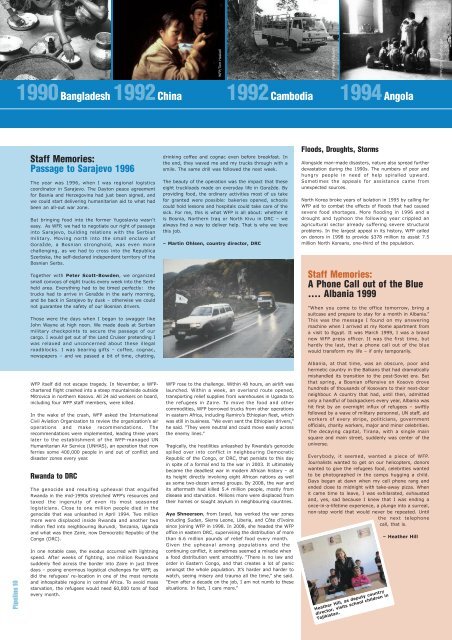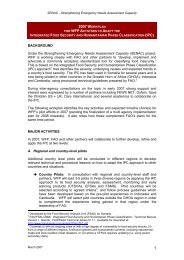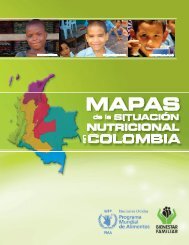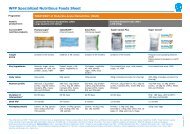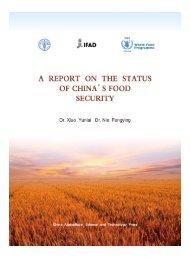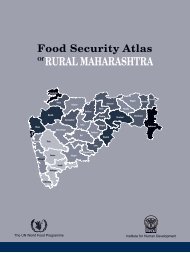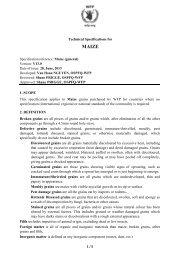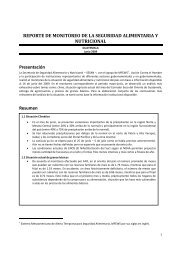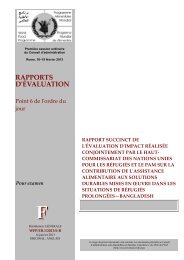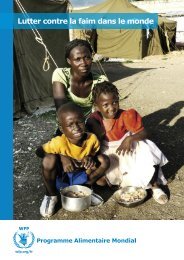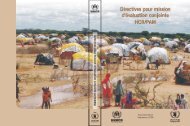<strong>WFP</strong>/Mercedes Sayagues<strong>WFP</strong>/Tom Haskell<strong>WFP</strong>/Paul Mitchell<strong>WFP</strong>/Chris Sattleberger1990 Bangladesh 1992 China 1992 Cambodia 1994 AngolaStaff Memories:Passage to Sarajevo 1996The year was 1996, when I was regional logisticscoordinator in Sarajevo. The Dayton peace agreementfor Bosnia and Herzegovina had just been signed, andwe could start delivering humanitarian aid to what hadbeen an all-out war zone.But bringing food into the former Yugoslavia wasn’teasy. As <strong>WFP</strong>, we had to negotiate our right of passageinto Sarajevo, building relations with the Serbianmilitary. Moving north into the small enclave ofGoražde, a Bosnian stronghold, was even morechallenging, as we had to cross into the RepublicaSzerbska, the self-declared independent territory of theBosnian Serbs.Together with Peter Scott-Bowden, we organizedsmall convoys of eight trucks every week into the Serbheldarea. Everything had to be timed perfectly: thetrucks had to arrive in Goražde in the early morning,and be back in Sarajevo by dusk – otherwise we couldnot guarantee the safety of our Bosnian drivers.Those were the days when I began to swagger likeJohn Wayne at high noon. We made deals at Serbianmilitary checkpoints to secure the passage of ourcargo. I would get out of the Land Cruiser pretending Iwas relaxed and unconcerned about these illegalroadblocks. I was bearing gifts – coffee, cognac,newspapers – and we passed a bit of time, chatting,drinking coffee and cognac even before breakfast. Inthe end, they waved me and my trucks through with asmile. The same drill was followed the next week.The beauty of the operation was the impact that theseeight truckloads made on everyday life in Goražde. Byproviding food, the ordinary activities most of us takefor granted were possible: bakeries opened, schoolscould hold lessons and hospitals could take care of thesick. For me, this is what <strong>WFP</strong> is all about: whether itis Bosnia, Northern Iraq or North Kivu in DRC – wealways find a way to deliver help. That is why we lovethis job.– Martin Ohlsen, country director, DRCFloods, Droughts, StormsAlongside man-made disasters, nature also spread furtherdevastation during the 1990s. The numbers of poor andhungry people in need of help spiralled upward.Sometimes the appeals for assistance came fromunexpected sources.North Korea broke years of isolation in 1995 by calling for<strong>WFP</strong> aid to combat the effects of floods that had causedsevere food shortages. More flooding in 1996 and adrought and typhoon the following year crippled anagricultural sector already suffering severe structuralproblems. In the largest appeal in its history, <strong>WFP</strong> calledon donors in 1998 to provide $378 million to assist 7.5million North Koreans, one-third of the population.Staff Memories:A Phone Call out of the Blue…. Albania 1999“When you come to the office tomorrow, bring asuitcase and prepare to stay for a month in Albania.”This was the message I found on my answeringmachine when I arrived at my Rome apartment froma visit to Egypt. It was March 1999, I was a brandnew <strong>WFP</strong> press officer. It was the first time, buthardly the last, that a phone call out of the bluewould transform my life – if only temporarily.<strong>Pipeline</strong> 10<strong>WFP</strong> itself did not escape tragedy. In November, a <strong>WFP</strong>charteredflight crashed into a steep mountainside outsideMitrovica in northern Kosovo. All 24 aid workers on board,including four <strong>WFP</strong> staff members, were killed.In the wake of the crash, <strong>WFP</strong> asked the InternationalCivil Aviation Organization to review the organization’s airoperations and make recommendations. Therecommendations were implemented, leading three yearslater to the establishment of the <strong>WFP</strong>-managed UNHumanitarian Air Service (UNHAS), an operation that nowferries some 400,000 people in and out of conflict anddisaster zones every year.Rwanda to DRCThe genocide and resulting upheaval that engulfedRwanda in the mid-1990s stretched <strong>WFP</strong>’s resources andtaxed the ingenuity of even its most seasonedlogisticians. Close to one million people died in thegenocide that was unleashed in April 1994. Two millionmore were displaced inside Rwanda and another twomillion fled into neighbouring Burundi, Tanzania, Ugandaand what was then Zaire, now Democratic Republic of theCongo (DRC).In one notable case, the exodus occurred with lightningspeed. After weeks of fighting, one million Rwandanssuddenly fled across the border into Zaire in just threedays – posing enormous logistical challenges for <strong>WFP</strong>, asdid the refugees’ re-location in one of the most remoteand inhospitable regions in central Africa. To avoid massstarvation, the refugees would need 60,000 tons of foodevery month.<strong>WFP</strong> rose to the challenge. Within 48 hours, an airlift waslaunched. Within a week, an overland route opened,transporting relief supplies from warehouses in Uganda tothe refugees in Zaire. To move the food and othercommodities, <strong>WFP</strong> borrowed trucks from other operationsin eastern Africa, including Ramiro’s Ethiopian fleet, whichwas still in business. “We even sent the Ethiopian drivers,”he said. “They were neutral and could move easily acrossthe enemy lines.”Tragically, the hostilities unleashed by Rwanda’s genocidespilled over into conflict in neighbouring DemocraticRepublic of the Congo, or DRC, that persists to this dayin spite of a formal end to the war in 2003. It ultimatelybecame the deadliest war in modern African history – atits height directly involving eight African nations as wellas some two-dozen armed groups. By 2008, the war andits aftermath had killed 5.4 million people, mostly fromdisease and starvation. Millions more were displaced fromtheir homes or sought asylum in neighbouring countries.Aya Shneerson, from Israel, has worked the war zonesincluding Sudan, Sierra Leone, Liberia, and Côte d'Ivoiresince joining <strong>WFP</strong> in 1998. In 2008, she headed the <strong>WFP</strong>office in eastern DRC, supervising the distribution of morethan 6.6 million pounds of relief food every month.Given the upheaval among populations and thecontinuing conflict, it sometimes seemed a miracle whena food distribution went smoothly. “There is no law andorder in Eastern Congo, and that creates a lot of panicamongst the whole population. It’s harder and harder towatch, seeing misery and trauma all the time,” she said.“Even after a decade on the job, I am not numb to thesesituations. In fact, I care more.”Albania, at that time, was an obscure, poor andhermetic country in the Balkans that had dramaticallymishandled its transition to the post-Soviet era. Butthat spring, a Bosnian offensive on Kosovo drovehundreds of thousands of Kosovars to their next-doorneighbour. A country that had, until then, admittedonly a handful of backpackers every year, Albania washit first by an overnight influx of refugees – swiftlyfollowed by a wave of military personnel, UN staff, aidworkers of every stripe, politicians, governmentofficials, charity workers, major and minor celebrities.The decaying capital, Tirana, with a single mainsquare and main street, suddenly was center of theuniverse.Everybody, it seemed, wanted a piece of <strong>WFP</strong>.Journalists wanted to get on our helicopters, donorswanted to give the refugees food, celebrities wantedto be photographed in the camps hugging a child.Days began at dawn when my cell phone rang andended close to midnight with take-away pizza. Whenit came time to leave, I was exhilarated, exhaustedand, yes, sad because I knew that I was ending aonce-in-a-lifetime experience, a plunge into a surreal,non-stop world that would never be repeated. Untilthe next telephonecall, that is.Heather Hill, as deputy countrydirector, visits school children inTajikistan.– Heather Hill
<strong>WFP</strong>/Crispin Hughes<strong>WFP</strong>/R. Jones<strong>WFP</strong>/Clive Shirley<strong>WFP</strong>/Tom Haskell1995 1996 Uganda Ecuador 1997Kenya 1997DPRK(L to R) ‘Gang of Four’,Merete Johansson,Margaret Minitti, TrevorPage, Jianying Gong withfirst shipment of <strong>WFP</strong>food for DPRK.Jianying “Jan” Gong, who hadhelped open our Beijing office in1981, was called upon in 1995 toset up <strong>WFP</strong>’s new office inPyongyang, North Korea. Withindays, she was on a plane and in Pyongyang as part of<strong>WFP</strong>’s “Gang of Four,” as they became known locally.“Same old scene as China, I thought, the same bare,empty rooms,” Jianying recalled. “But this time, instead ofa manual typewriter, like in China, it was computers anda satellite phone.”Once out in the countryside assessing the flood damage,however, it was like a journey back in time. “Despite themodern appearance of the capital, Pyongyang, thecountryside was much the same as the rural China of mychildhood,” she said. “Despite my Canadian and UNpassports, the people looked like me and I could blend in.And when the first <strong>WFP</strong> food shipment arrived at the portof Nampo aboard the Russian ship Rabochaya Smena, Ifelt that same sense of pride as I did in China 10 yearsearlier – to be working for an organization that reallyhelps ordinary poor people.”Meanwhile in 1995, heavy monsoon rains caused manyrivers in Bangladesh to overflow their banks. Two-thirdsof the country was inundated, affecting 30 million peopleand destroying 300,000 tons of rice crops. <strong>WFP</strong>responded with an emergency relief operation to feed 19million people, the largest number the organization hadever fed in a single disaster. More than 330,000 tons ofwheat and rice were provided, averting starvation andmalnutrition.In 2000, drought again struck the greater Horn of Africa,threatening the lives of 16 million people across Djibouti,Eritrea, Ethiopia, Kenya, Somalia and Sudan. Food andwater shortages provoked mass migrations of people insearch of food and water – and pasture for their herds.Panic sales of livestock and other household assets werewidespread. Open warfare between Eritrea and Ethiopiadid not help. The hostilities closed the ports of Massawaand Assab on the Eritrean Red Sea coast, both traditionalentry points for supplies bound for Ethiopia and beyond.In March, UN Secretary-General Kofi Annan appointedExecutive Director Catherine Bertini as his specialenvoy to the Horn. Her three trips to the region helpedestablish a relief corridor through Djibouti port, where<strong>WFP</strong> upgraded the facilities and enhanced the port’scapacity. Eventually, <strong>WFP</strong> delivered one million tons offood aid to the drought-stricken countries of the area.While the Horn suffered from lack of water, southernAfrica was hit by floods. One-third of Mozambique laysubmerged under devastating floodwaters in 2000,causing huge losses to infrastructure, livestock andlivelihoods.<strong>WFP</strong> launched and supervised a huge humanitarian reliefeffort, including a helicopter operation that, in addition todelivering life-saving food supplies, performed severaldramatic feats of rescue by plucking stranded people fromroof tops and tree branches. “It was a key moment for<strong>WFP</strong> – and for me,” recalled Georgia Shaver, thencountry director in Mozambique. “It was my first airoperation – and my first time signing cheques for millionsof dollars. Our efforts were complicated by floods in thecapital of Maputo, which cut all our exit routes, closedschools for months, dislocated staff and generallywreaked havoc. It was simply exhausting but, at the endof the day, we managed to save a lot of lives.”West Africa, meanwhile, was in a new cycle of turmoilgiven the political upheaval in previously stable Côted’Ivoire. Trudy Bower was in the country office from1991-2002, first as deputy country director, then countrydirector – and throughout, raised two daughters on herown.“This was a hot, politically volatile period that saw sevenattempted coups d’état,” said Trudy, who retired in 2012.“It was a case of divided loyalties – trying to juggle myresponsibilities for staff security, and the safety and wellbeingof my daughters.” During two of the coups, Trudyorganized convoys to ferry staff safely home, whilesimultaneously figuring out how to get her girls homefrom school. The last coup in 2002 which ultimately splitthe country in two was the most frightening, as it cameout of the blue following a period of relative calm andstability.Staff Memories:Deep Down the LibyanCorridor 2004Jack Saenen, whodied in March 2012,attained nearlegendarystatus at<strong>WFP</strong> as an intrepid andresourceful logisticsofficer –as well as abeloved colleague andmentor. “I knew I couldask Jack to do impossiblethings, and he willsomehow get them done,”said Kenro Oshidari, whoworked with Jack during theKosovo crisis and later duringthe immediate aftermath of theAsian tsunami. One of his best-known ventures was toopen the Libyan cross-border humanitarian corridor tohard-to-access eastern Chad in 2004, establishing acritical lifeline for refugees sheltering there. The vitalcorridor was shut down by the wave of political upheavalthat swept through North Africa in early 2011, posingnew and formidable logistical challenges to delivering thefood to the refugees.<strong>WFP</strong> video producer Casey Kauffman accompaniedJack when he led the first convoy down an ancientcaravan route across the Sahara in August-September2004, and wrote this account for a 2005 edition of<strong>Pipeline</strong>:While other routes are affected by seasonal rains, orinsecurity, this commercial one – stretching from Libya'sMediterranean port of Benghazi, across the Saharadesert to eastern Chad – allows secure, year-roundaccess to some 200,000 people currently in the camps.That is why <strong>WFP</strong> appealed to the Libyan authorities toopen it up as a humanitarian corridor, and signed alandmark, 10-year agreement with the government inJuly 2004.Over the next three months, more than 9,000 tons of<strong>WFP</strong>/Pietro BertoraJack Saenen, who led <strong>WFP</strong>’s firstconvoy from Libya to Chad, standsin front of map showing thecorridor.“Our house was situated between two strategic targets inthe political struggle – the headquarters of the militarypolice and the Interior Ministry (the Interior Minister wasassassinated),” she recalled. “When the bullets startingflying in the street, they came through the balcony of mydaughters’ bedroom. They were nine and 12 at the time.I crawled along the floor to them and we crawled back tohunker down on the other side of the house, away fromthe street, with our golden retriever. The situation lastedfor days because there was no way to get them to theairport. In the meantime, our staff was trapped withoutfood and water in our sub-office in Bouake, behind rebellines up north. The only solution was to tell those staffersto make a run for it across town to hook up with a Frenchmilitary convoy that was evacuating French nationals.”Reinventing <strong>WFP</strong>From its inception, saving lives had always been <strong>WFP</strong>’score task. But in the decade from 1992 to 2002, theorganization dramatically changed the way it went aboutits business. In 1992, <strong>WFP</strong> was a hierarchical, top-downinstitution run by headquarters administrators who werefood aid arrived at Benghazi and was loaded ontoconvoys of 20 to 40 trucks that headed first to AlKufra, an ancient trading post on the edge of theSahara. Here, where most of the truckers were born,they stock up on live goats, spare parts, fuel, water,tea, and charcoal – everything necessary for thegruelling, two-week journey across 1,700 km ofsand and rock.I thought I had seen the vastness of the desertbefore I travelled along the Libyan corridor. Anhour after you leave Al Kufra, you lose yourreference point and sense of orientation andyou get it back two weeks later. You becomecompletely dependent on the trucks and thedrivers and mechanics who move them. Theyare the real protagonists – following tracksthat I never could see, and stars I didn'tknow, the drivers proceeded without compass orGPS. The creative repairs to get us out of the sand andkeep us moving were amazing.After 14 days of hauling 440 tons of food through dirtand sand, we saw our final destination emerging fromthe brown, barren Sahel of eastern Chad. The Irdimirefugee camp is a sprawling settlement of makeshiftshacks and tents where more than 15,000 Darfurianslive. The trucks rolled into the camp and thedistribution of wheat flour began immediately. Whiledozens of curious kids played, their mothers, clad inbrightly coloured clothes, stood in a serious line, theirfood bags open. Some greeted us with a smile, butmost just concentrated on getting their fair share.Our job done, we slowly drove out of the camp,passing families and donkeys laden with bags of flour.And before conversation turned to where we could finda good wash and a place to sleep, I noticed anexpression of quiet satisfaction on our faces. In Jack’swords: "People have been travelling this route forcenturies. It is one of those ancient desert routes thathas seen everything go by: slaves, salt, gold, and ivoryin the past and more recently, illegal migrants andarms. Now, we have shown that the Libyan corridor isalso a feasible humanitarian route to reach Sudaneserefugees who need food from <strong>WFP</strong>."– Casey Kaufmann<strong>Pipeline</strong> 11


